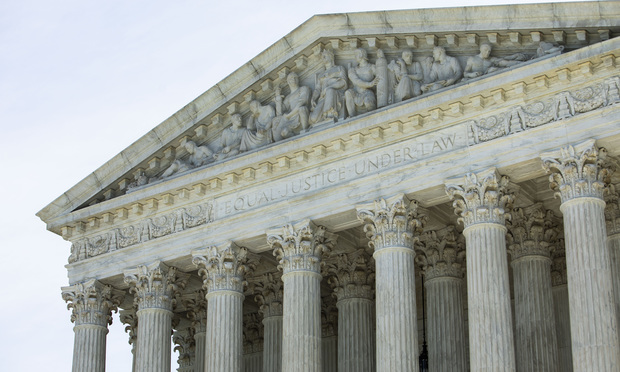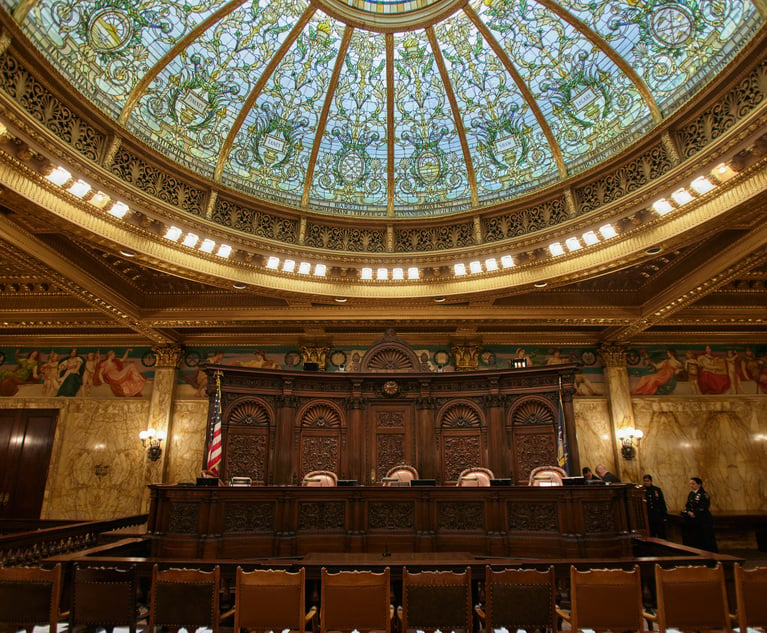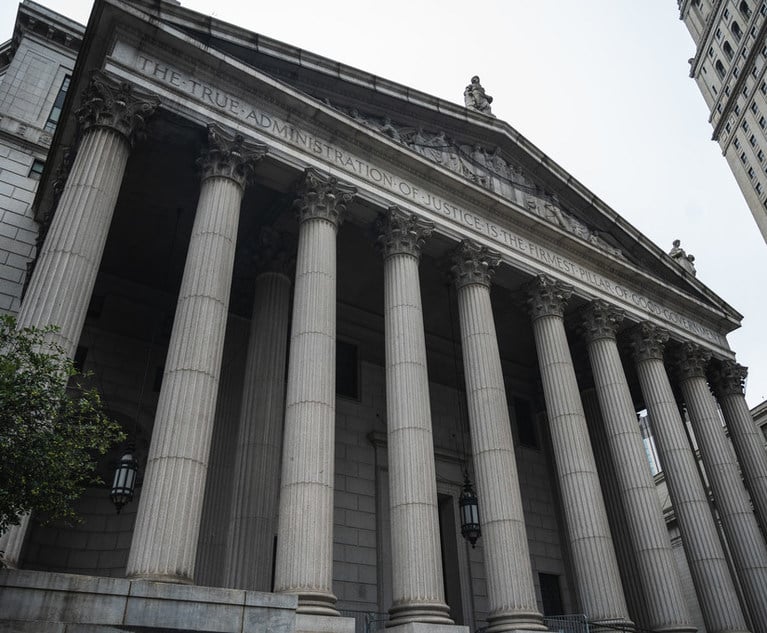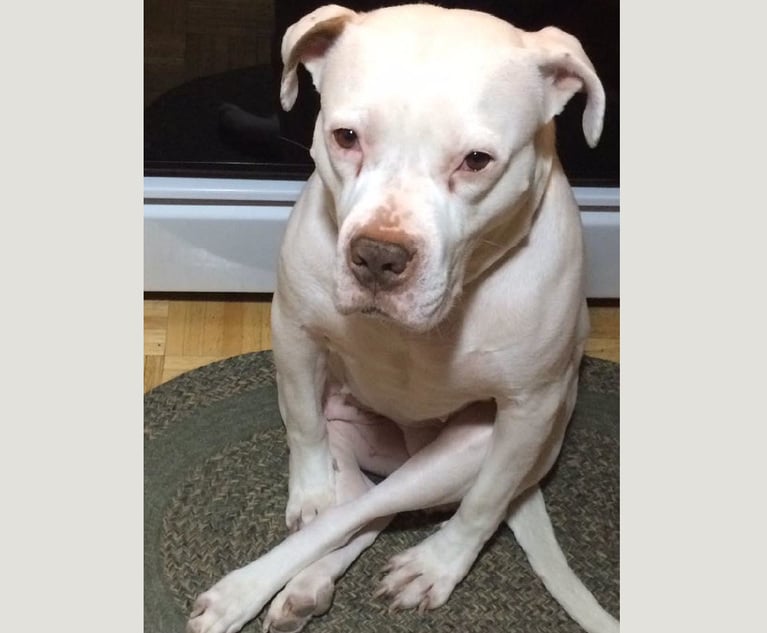Lawyer Thrown Out at 2nd Circuit Tries SCOTUS Appeal
"I think oral argument is largely a charade," Todd Bank said. But he doesn't believe his dust-up with the Second Circuit should figure into the Supreme Court's decision on the case, which centers on a rule requiring bar applicants to file sponsor affidavits.
April 21, 2020 at 07:43 PM
4 minute read
 U.S. Supreme Court building April 23, 2019. Photo: Diego M. Radzinschi/ALM
U.S. Supreme Court building April 23, 2019. Photo: Diego M. Radzinschi/ALM
New York attorney Todd C. Bank, who was thrown out of the U.S. Court of Appeals for the Second Circuit last year for what he admits was a "sarcastic" remark to one of the judges, is asking the U.S. Supreme Court to review the argument he was trying to make that day.
Bank represents Robert Doyle, who is challenging the constitutionality of a local bar rule for the Eastern District of New York that requires applicants to provide sponsoring affidavits from other attorneys vouching for character and legal experience.
Bank, a Kew Gardens, Queens, solo, filed a 31-page certiorari petition on behalf of Doyle with the Supreme Court on Monday. The petition contends that, "in order for [Doyle] to enable a member of the bar" to provide "a reasonably accurate assessment" of his character, he would be required to "disclose beliefs regarding philosophical, religious, political, social, moral, and ethical matters."
The argument is that the requirement violates the First Amendment.
"The right not to speak is equally protected as the right to speak, and the right not to engage in speech related association is equally protected as the right to engage in such association," Bank argued on Doyle's behalf in the petition.
Bank, reached by phone, said Tuesday he doesn't believe his dust-up with the Second Circuit should figure into whether the Supreme Court decides to review the case.
"It could only affect it if the Supreme Court is aware of it," Bank said.
He didn't mention the episode in his petition, nor did the Second Circuit panel mention it in denying his appeal in December.
The New York Law Journal reported on the drama—which was also discussed on social media. The December 2019 hearing started with Bank telling the appellate panel he had nothing new to add beyond what he wrote in his briefs. Bank said he assumed the judges were familiar with the record, and asked if anyone had questions for him.
Circuit Judge Denny Chin asked about the affidavit rule's alleged harm to Doyle, then pressed Bank to articulate what the alleged injury was—essentially, why he's in court in the first place.
"Are you serious, judge? With all due respect, I don't know what to say," Bank said at the time.
Chin responded: "You know what, I withdraw my question. You can sit down."
"OK, well, thank you. Thank you very much, judge. I see that you read the briefs thoroughly," Bank said.
Chin replied: "Well, well, you are acting in a disrespectful and discourteous manner, and that's not appropriate."
Assistant U.S. Attorney Matthew Modafferi then rested on the arguments in the briefs, prompting Bank to ask for rebuttal time. Chin and a second judge told Bank he had "waived" rebuttal and was excused. Judge Barrington Parker then asked that Bank be removed from the courtroom.
Bank said in Tuesday's phone interview that although he had never been escorted out of a courtroom before, it was not his first time to feel frustrated with what seems like a lack of attention to his hard work writing briefs.
"I think oral argument is largely a charade," Bank said. "The judges pretend to be intellectual, but often they don't care."
Asked how he feels about the prospect of oral arguments before the Supreme Court, he said that would require the justices to grant certiorari—which he acknowledged is "statistically improbable" anyway.
On the other side of the case is U.S. Solicitor General Noel J. Francisco. His office did not respond immediately to a request for comment Tuesday.
This content has been archived. It is available through our partners, LexisNexis® and Bloomberg Law.
To view this content, please continue to their sites.
Not a Lexis Subscriber?
Subscribe Now
Not a Bloomberg Law Subscriber?
Subscribe Now
NOT FOR REPRINT
© 2025 ALM Global, LLC, All Rights Reserved. Request academic re-use from www.copyright.com. All other uses, submit a request to [email protected]. For more information visit Asset & Logo Licensing.
You Might Like
View All
Decision of the Day: Trial Court's Sidestep of 'Batson' Deprived Defendant of Challenge to Jury Discrimination

Decision of the Day: Commercial Division Finds Defendant Engaged in Unfair Competition Against Plaintiff

Decision of the Day: Court Rules on Judgment Motions Over Police Killing of Pet Dog While Executing Warrant

Decision of the Day: JFK to Paris Stowaway's Bail Revocation Explained
Trending Stories
- 1Uber Files RICO Suit Against Plaintiff-Side Firms Alleging Fraudulent Injury Claims
- 2The Law Firm Disrupted: Scrutinizing the Elephant More Than the Mouse
- 3Inherent Diminished Value Damages Unavailable to 3rd-Party Claimants, Court Says
- 4Pa. Defense Firm Sued by Client Over Ex-Eagles Player's $43.5M Med Mal Win
- 5Losses Mount at Morris Manning, but Departing Ex-Chair Stays Bullish About His Old Firm's Future
Who Got The Work
J. Brugh Lower of Gibbons has entered an appearance for industrial equipment supplier Devco Corporation in a pending trademark infringement lawsuit. The suit, accusing the defendant of selling knock-off Graco products, was filed Dec. 18 in New Jersey District Court by Rivkin Radler on behalf of Graco Inc. and Graco Minnesota. The case, assigned to U.S. District Judge Zahid N. Quraishi, is 3:24-cv-11294, Graco Inc. et al v. Devco Corporation.
Who Got The Work
Rebecca Maller-Stein and Kent A. Yalowitz of Arnold & Porter Kaye Scholer have entered their appearances for Hanaco Venture Capital and its executives, Lior Prosor and David Frankel, in a pending securities lawsuit. The action, filed on Dec. 24 in New York Southern District Court by Zell, Aron & Co. on behalf of Goldeneye Advisors, accuses the defendants of negligently and fraudulently managing the plaintiff's $1 million investment. The case, assigned to U.S. District Judge Vernon S. Broderick, is 1:24-cv-09918, Goldeneye Advisors, LLC v. Hanaco Venture Capital, Ltd. et al.
Who Got The Work
Attorneys from A&O Shearman has stepped in as defense counsel for Toronto-Dominion Bank and other defendants in a pending securities class action. The suit, filed Dec. 11 in New York Southern District Court by Bleichmar Fonti & Auld, accuses the defendants of concealing the bank's 'pervasive' deficiencies in regards to its compliance with the Bank Secrecy Act and the quality of its anti-money laundering controls. The case, assigned to U.S. District Judge Arun Subramanian, is 1:24-cv-09445, Gonzalez v. The Toronto-Dominion Bank et al.
Who Got The Work
Crown Castle International, a Pennsylvania company providing shared communications infrastructure, has turned to Luke D. Wolf of Gordon Rees Scully Mansukhani to fend off a pending breach-of-contract lawsuit. The court action, filed Nov. 25 in Michigan Eastern District Court by Hooper Hathaway PC on behalf of The Town Residences LLC, accuses Crown Castle of failing to transfer approximately $30,000 in utility payments from T-Mobile in breach of a roof-top lease and assignment agreement. The case, assigned to U.S. District Judge Susan K. Declercq, is 2:24-cv-13131, The Town Residences LLC v. T-Mobile US, Inc. et al.
Who Got The Work
Wilfred P. Coronato and Daniel M. Schwartz of McCarter & English have stepped in as defense counsel to Electrolux Home Products Inc. in a pending product liability lawsuit. The court action, filed Nov. 26 in New York Eastern District Court by Poulos Lopiccolo PC and Nagel Rice LLP on behalf of David Stern, alleges that the defendant's refrigerators’ drawers and shelving repeatedly break and fall apart within months after purchase. The case, assigned to U.S. District Judge Joan M. Azrack, is 2:24-cv-08204, Stern v. Electrolux Home Products, Inc.
Featured Firms
Law Offices of Gary Martin Hays & Associates, P.C.
(470) 294-1674
Law Offices of Mark E. Salomone
(857) 444-6468
Smith & Hassler
(713) 739-1250






